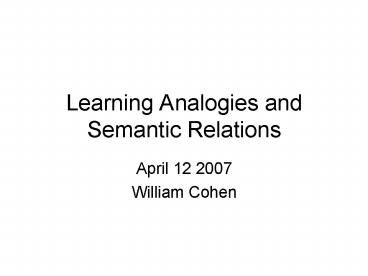Learning Analogies and Semantic Relations - PowerPoint PPT Presentation
1 / 20
Title:
Learning Analogies and Semantic Relations
Description:
and also relations between entities. How do you determine if you ' ... Is it surprising that information about relation similarity is spread out across ... – PowerPoint PPT presentation
Number of Views:24
Avg rating:3.0/5.0
Title: Learning Analogies and Semantic Relations
1
Learning Analogies and Semantic Relations
- April 12 2007
- William Cohen
2
Announcements
- No critiques next week.
- No class at all Thus (carnival)
- Project presentations start April 24th
- First up Jana Terrill, Yimeng
- 30min each
- Final class is May 10th, 12-2pm.
3
Machine Learning, 2005
4
Motivation
- Information extraction is about understanding
entity names in text - and also relations between entities.
- How do you determine if you understand an
arbitrary relation? - For fixed relations R labeled data (ACE)
- For arbitrary relations ?
5
Evaluation
6
How do you measure the similarity of relation
instances?
- Create a feature vector rxy for each instance
xy - masonstone ? lt0.123, 0.001, 5.47, gt
- soldiergun ? lt6.54, 0.013, 13.201, gt
- Use cosine distance.
7
Creating an instance vector for xy
- Generate a bunch of queries .
- X of the Y (stone of the mason)
- X with the Y (soldier with the gun)
- For each query qj(X,Y), record the number of hits
in a search engine as rxy,j - Actually record log(hits1)
- Actually sometimes replace X with stem(X)
8
The queries used
Similar to Hearst 92 followups
9
Some results
Ranking 369 possible xy pairs as possible answers
10
How do you measure the similarity of relation
instances?
- Create a feature vector rxy for each instance
xy - Use cosine distance to rank (a),(d)
- Test-taking strategy
- Define margin(bestScore-secondBest)
- If marginlt? and ?gt0 then skip
- If marginlt? and ?lt0 then guess the top 2.
11
Results
12
Results
13
Results
14
Followup work
Turney, CL 2006
- Given xy pairs, replace vectors with rows in M
- Look up synonyms x, y of x and y and construct
near analogies xy, xy. Drop any that dont
occur frequently. - - e.g. masonstone ? masonrock
- Search for phrase x Q y or y Q x, using near
analogies as well as original pair xy, and any
sequence of up to three words Q. - For each phrase create patterns by introducing
wildcards. - Build a pair-pattern matrix frequency M.
- Apply SVD to M to get best 300 dimensions ?M.
- Define sim1(xy, uv) cosine distance in M.
Compute similarity of xy and uv as average of
sim1(p1,p2) for all pairs p1,p2 where (a) p1 is
xy or an alternate (b) p2 is uv or an
alternate and (c) sim1(p1,p2)gtsim1(xy,uv)
15
Results for LRA
56.5
40.3 VSM-WMTS
On 50B word WMTS corpus
16
Additional application relation classification
17
Relation classification
18
Ablation experiments - 1
19
Ablation experiments - 2
What is the effect of using many
automatically-generated patterns vs only 64
manually-generated ones? (Most of manual patterns
are found automatically).
Feature selection in pattern space instead of SVD
20
Lessons and questions
- How are relations and surface patterns
correlated? - One-many? (several class-subclass patterns)
- Many-one? (some patterns are ambiguous)
- Many-many? (and is it 10-10, 100-100, 1000-1000?)
- Is it surprising that information about relation
similarity is spread out across - So much text?
- So many surface patterns?































